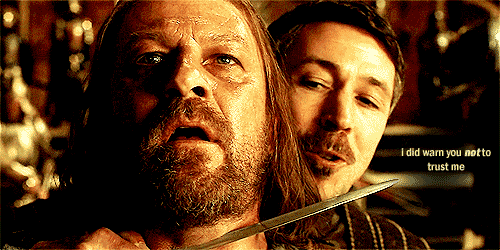This blog is a part of a larger project associated with scholarsofthethrone.com. Visit our site for more information.
Who is next in line for the Iron Throne?
When Stannis and Renly have their cliff-side meeting, each appears to be placing himself within a greater non-diegetic political context. We have Stannis who favors a more traditional climate by which primogeniture dictates his succession. Renly on the other hand is banking on his own popularity among the masses as an indicator that he would be a much more effective and loved leader of the seven kingdoms.
Renly's claim to the throne breaks with the Westrosi tradition that favors a distinct line of procession and hints at a move toward a more democratic process by which the people have a voice in who will ascend to a ruling position. He believes that he is the right man for the job because he is beloved by his people. Renly even makes a point of stating, "No one wants [Stannis] for their king" and even elaborates further, (referring to his men) "the men holding those bolts of cloth will make me king" ("Garden of Bones"). Clearly Renly's second statement is largely a reference to these men's effort in a war against Stannis, but by using it as a follow up to his claim that Stannis is not a king that the people would want, he is also utlizing his comment to elevate the importance of the will of the people. We realize by the next episode that the will of the people will not be honored, but this does demonstrate the starkly different political ideas that exits between Stannis and Renly.
Of course, it would seem that the laws of primogeniture should, in some ways invalidate Renley's claim to the iron throne anyway. After all, he is the youngest of the Baratheon brothers and in a paradigm that follows the rules of primogeniture, one's birth order is highly consequential to the process of making determinations such as the next in line to be king. However, the Baratheon's have already proven that, strictly speaking, being lucky enough to fall in line by virtue of birth is not the only means of attaining the throne.
King Robert's "ascension" to the throne, for example, was a clear deviation from the more accepted paradigm in that he usurped the Mad King, Aerys Targeryen, after organizing a rebellion. Of course, the fact that Robert had no birth right to the throne, only gaining it by force, and that Joffrey's occupation is (rightly) being questioned because he is suspected of being the bastard result of an incestuous relationship between Cersei and Jamie Lannister, means that the process of gaining the throne and who has actual succession rights is clearly very nebulous at the moment (thus the intriguing nature of the show).
A clashing of Politics
In addition to the difference in both Stannis and Renly's positions concerning ascension to the throne, these two characters seem to be nodding at a more modern clash in politics concerning religion and personal freedoms.
Stannis has begun following The Lord of Light and this piece of the story becomes one of the highlights in his attempt to gain the iron throne. In fact, Mellisandre (whose nickname I can finally reveal as "The Vagina Monster Mama") is a large influence on Stannis and the way that he operates, a circumstance that would likely continue if he were to gain the throne. Stannis has even gone so far as to change his traditional Baratheon sigil to include the "fiery heart of the lord of the light." In the video clip above, Renly points out the glaring difference between their banners even though they are technically members from the same house. Stannis, from a modern perspective can be viewed as resembling (to a degree) certain members of the far right whose strict religious views seem to dictate (at least some of) their political positions.
Renly on the other hand is a more progressive figure who eschews the prescribed roles of his gender. Although he is not openly gay, this fact really does not appear to be much of a secret among the court. Because of Renly's character traits being set up in direct opposition to Stannis, Renly's character can be interpreted as a figure of the progressive left. Of course, in a story-world that is far removed from the modern era, Renly's progressive agenda barely stands a chance against the vitriolic right of center ways of Westeros and, thus, Renly is literally killed by Stannis' religion.
Works Referenced
"Garden of Bones." Game of Thrones: Season 2. Writ. Vanessa Taylor. Dir. David Petrarca. HBO, 2012. Xfinity On Demand. 19 Feb 2012.
_________________________________________________________________________________
ADVERTISEMENT
_________________________________________________________________________________
ADVERTISEMENT





























